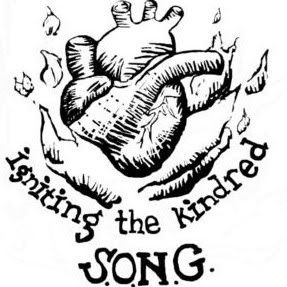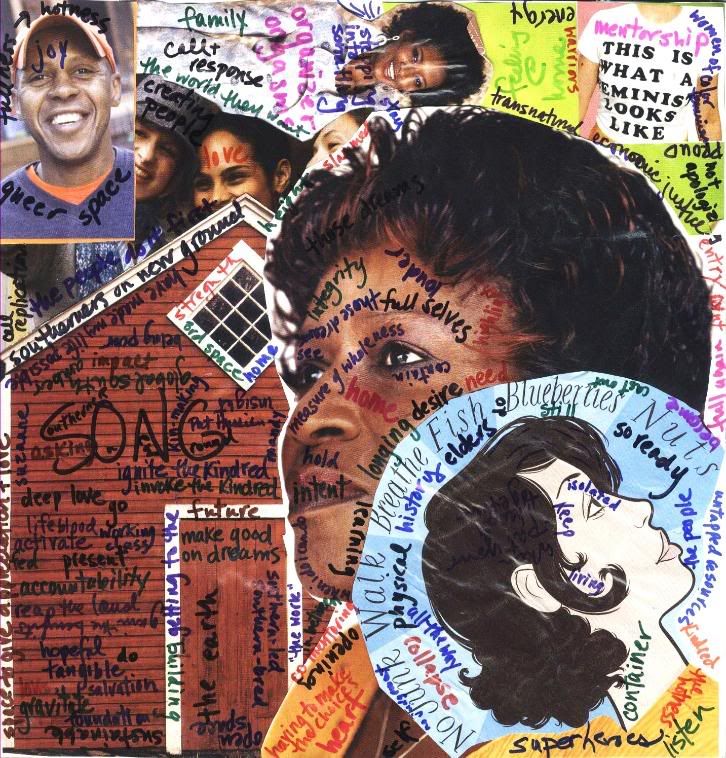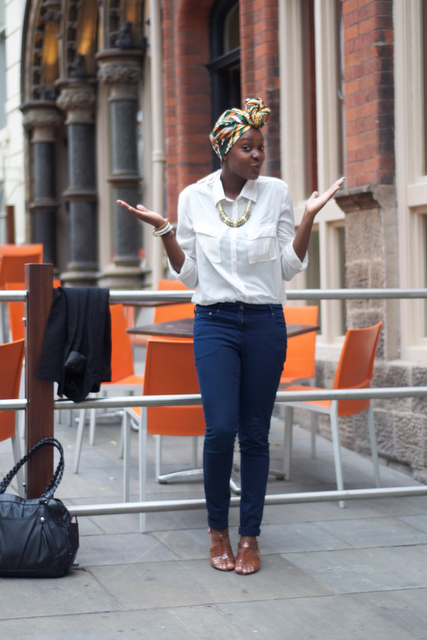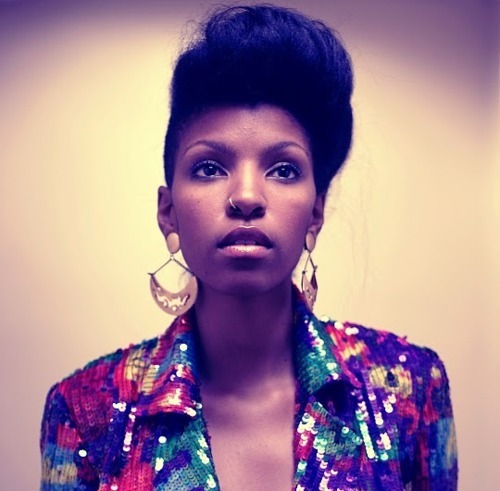|
Wednesday, August 31, 2011
SONG August Updates
[Quirky Black Girls] To the cool folk Alexis Pauline Gumbs and I met...
Moya 10:30am Aug 31 To the cool folk Alexis Pauline Gumbs and I met at JeJu... (and everybody else) here are the deets for Sunday's Cook OUT! http://www.facebook.com/l/7AQAal55OAQBxoVd3-c_rktHYuZYW7L-HgIwrUKdmDF5p-Q/www.evite.com/app/publicUrl/NJIIMEMRFLQFUDGQQVST/qbg4
Tuesday, August 30, 2011
What Sistas Want, What Sistas Believe

Black Feminist Twelve Point Plan
We are a collective of black feminists/womanists activists who are committed to the liberation of the black community. As black women the conditions of our lives are created by interlocking systems of oppression. As a collective we oppose all forms of oppression and are continuously working to develop our analysis to be effective allies with other marginalized communities. We created this platform to address the misconceptions about what black feminists/womanists believe, where our allegiances lie and what we want for the black community. We recognize that the problems that exists within the black community are connected to larger systems of oppression and domination. However, this document addresses those issues that disportionately affect the black community because this is the community that we as black feminists identify as our homebase and foundation. We developed this statement from a place of love and not divisiveness, as we struggle along with our brothas and black people of all genders for the safety, security, and liberation of our community. We believe that the liberation of black women is necessary and integral to the liberation of the black community and not separate from it.
1.WE WANT FREEDOM.
We believe that freedom is only possible through individual and community self-determination. In order for the black community to achieve self-determination all systems of oppression must be dismantled.
2. We want a reformation of the criminal justice system, the abolition of the prison industrial complex and the implementation of community based models of justice and accountability.
This system has routinely targeted Black folks in the form of police brutality and covert corruption in the penal system that has led to the mass incarceration of Black people. The prison system violates human rights, causes the separation of families and capitalizes off the neo-slave labor of Black and Brown bodies that has been the basis of a profitable prison industrial complex.
3. We want control over our reproductive health and believe it is essential to building and maintaining strong black communities.
The United States government has, from its inception, consistently attempted to regulate, scapegoat and profit from the reproductive capabilities of black people. The denial of reproductive justice and autonomy began during slavery and continues today in the form of sterilization abuses, purposeful prescription of harmful contraceptives, and the targeting of black women as eugenicists for demanding access to safe and legal abortions. We demand an end to the pathology and criminalization of black motherhood and families the right to affordable and safe reproductive health care for all.
4. We want an end to all forms of physical, emotional, and sexual violence against black children.
We oppose the continued removal of black children from their homes by state agencies and see it as a part of a continued assault on black families and a form of cultural genocide. Children in general, and black children in particular, are seen as less than human which makes them easy targets in a system where dependence is seen as weakness and vulnerability. Therefore we recognize that dismantling systems of oppressions that promote hierarchies of dehumanization are in the best interest of black children. Specifically we want to break the cycles of violence that exist in our communities.
5. We want media to reflect the diversity of who we are, to include our voices, value our bodies and our stories.
We believe that the media both mirrors and shapes society. Therefore there is a need to develop a critical eye towards our media consumption, as the media is a system that perpetuates oppression. We believe in a shared responsibility to consume, demand and create the messages and representations that truly reflect our humanity.
6. We want an end to poverty and the development of an economy that benefits and provides for all people.
We believe that capitalism is a destructive system that commodifies people and the planet and promotes oppression. As black feminists and working people, we want jobs with dignity and a wage that is consistent with the real costs of living and ensures all people access to basic human needs. We want an economy that treats all labor as meaningful and valuable to society. Specifically, we want an end to the devaluation of the labor of marginalized people as well as the work that is usually confined to the lowest wage job segments. We want a foreign economic policy based in equity and fair trade.
7. We want education for liberation that includes equitable distribution of funding, culturally relevant curriculum, community control of schools and an end to the school to prison pipeline.
As Black folks we have a history of communally organized educational spaces and understand that education can be used as a tool for liberation or reinforcing systems of oppression. We want an end to curriculum centered on standardized testing and one that prioritizes the development of critical thinking and creativity.
8. We want access to secure, equal, safe, affordable and hazard free housing (public and private), community land rights, residencies of our choice and an end to homelessness.
We demand lease security, stabilized rent control, an end to discriminatory lending practices, poor shelter systems and the continuous displacement of Black and Brown folks from natural disasters and gentrification.
9. We want to live in a society where we can feel safe and protected.
We believe that we must work together to create safe spaces in both our homes and the public spaces our bodies occupy. We reject language that promotes hatred and fear and seek to promote healing and transformation by breaking longstanding cycles of violence in the Black community. Whether verbal, physical, emotional, or sexual, we must break the silence around all violence, and the various ways it encroaches on our daily living.
10. We want an end to invisibility, violence and homophobia towards LGBTQ people in our community.
We believe that sexual desire and the expression of that desire is normal, healthy , and varied and that people should be free to express their desires without fear of violence.
A diversity of gender identities, body expressions and sexual performances is and has always been apart of the Black Diasporic community. We want protections and resources for our young people around homlessness, bullying and healthcare. We believe that the sexual and gender liberation of women and queer folk are interlocking struggles that cannot be won on a fragmented front. We believe in gender self -determination and demand an end to violence against transgender and gender non-conforming people.Homophobia and other forms of hatred are the antithesis of the life-affirming communities we desire to create. We want all black people to stand in solidarity with LGBTQ people of African descent for the futures of our young people and the generations to come.
11. We want a world where respect of the Earth’s resources is central to every human society and economic system.
We believe that it is necessary that humanity creates, builds, and operates from the understanding that we are part of nature, not separate or above it. As women’s reproductive health, the growth and development of our children and the longevity of our elders are all interconnected to the well-being of our environment, we believe in education and action around local sustainable agriculture and food security, safe drinking water, environmental preservation and the reduction of environmental toxins in our communities. We want an end to environmental injustices that deteriorate the health, resources and land of poor Black, Brown and Indigenous communities. We must all take part in resisting the consumerism and materialism of capitalism and instead value sustainable lifestyles and economic systems that honor ecological balance.
12. We want a black community free of sexism and sexist oppression, where Black Women can be self-determined members of their community.
We believe that sexism and sexist oppression limit both individual and collective freedom, as an individuals inability to self-actualize hinders the growth of the community . People of all genders need to address ideas of masculinity, femininity, and sexual normativity that limit potential, and inspire abuse and hatred. We want our Brothas to challenge all negative assumptions and actions against Black Women. We demand for them to look upon us as allies in ending all forms of oppression, regardless of our own political affiliations i.e. Black Feminism. We also want them to see issues pertaining to Black Women as viable issues that the whole community should address, and how it is important that Black Women speak of these issues inside of our community, without retaliation. We demand our right to be recognized as autonomous and complete human beings.
*This twelve point platform was created by the Black Feminist Working Group (BFWG). (Iresha Picot, Kimberly Murray, Tiamba Wilkerson, Nuala Cabral, Darasia Shelby and Ladi’Sasha Jones).
**This document is inspired by the work and legacy of the Combahee River Collective and the Black Panther Party for Self Defense. Contact BFWG at Blackfeministgroup@gmail.com

#blackgirlsarefromthefuture.blackandkillingit:iambabz:blackf...
Sent to you by moya via Google Reader:
via New Model Minority by newmodelminorityarchive on 8/30/11
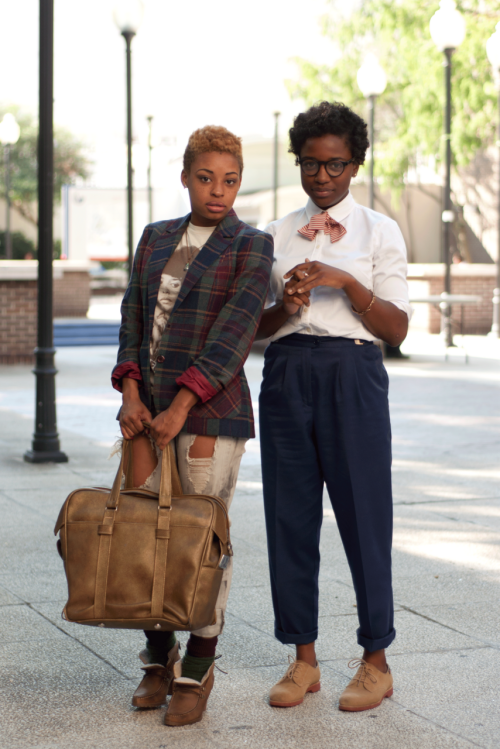
#blackgirlsarefromthefuture.
Submitted by newtimer.tumblr.com
see this is what I am talking about!
@blackandkilling #BGKI
Things you can do from here:
- Subscribe to New Model Minority using Google Reader
- Get started using Google Reader to easily keep up with all your favorite sites
blackandkillingit: @blackandkilling #BGKI
Sent to you by moya via Google Reader:
Things you can do from here:
- Subscribe to freedom fighter. using Google Reader
- Get started using Google Reader to easily keep up with all your favorite sites
Monday, August 29, 2011
What's Your Fantasy?
Sent to you by moya via Google Reader:
via my best friend gayle by summer of sam on 8/29/11
I keep trying to come up with reasons to justify my addiction to (fantasy) football. I praise the parity of the NFL and argue that the helmets help create anonymity that makes football the ultimate team sport. I discuss the elegance of a tightly thrown spiral arching through the air, landing in the hands of wide receiver walking the tight rope of a sideline. Those things may all be true. But what is also true is that football is America's gladiator sport. It is violent and boorishly brutal. And homoerotic as hell. I love it.
Last Friday marked the inaugural draft party of the Dirty Dianas Fantasy Football League. A small group of women gathered at my homie, Maeg's house to
get drunk
get in on the nerdiest way to watch sports. As the commissioner of this new league, I wanted a few things to happen: our league would be all women, we would throw a party (and there would be cake!), and despite my ophidiophobia, we'd hold a snake [!!!!] draft.
There are a myriad of ways that one can construct a fantasy football league. But, from what I can tell, there are two ways to hold a draft. The most common way is a snake [!!!!] draft, where the first person to draft in round one will be the last to draft in the second round, etc. According to the fantasy experts, though, the fairest way to draft is via auction, where players are ranked, their "dollar" value pre-determined, nominated during the draft process, and auctioned off to the highest "bidder." Yes, you read that correctly.
I know, I know. LeBron's infamous decision last summer stirred up incredible controversy, including discussions about whether or not multi-million dollar athletes could liken themselves to slaves. Indeed, professional sports is not chattel slavery, but the lexicon of slavery remains hauntingly useful for those who talk about sports. One need only follow scouts on Twitter during the NFL combine--the "audition" many college football players participate in before the actual draft--to understand what I mean. But in case you missed those tweets last spring, the language around fantasy football helps illustrate, too.
If you peruse ESPN's fantasy football rankings, for instance, you will find a dollar amount next to each name on the list under the heading "Auction." Of the top fifteen players, 14 are black. In a league where 65% of the players are black, the ease with which commentators and fantasy fans employ the language of slavery is chilling. Fantasy football participants love to talk about the players they own. Yes, own. Listening to a fantasy football podcast for just a few minutes in, say, October, will yield discussions of trade value and whether or not a player is equal to another. Now that I have successfully uploaded the team rosters on to our site, any member of the Dirty Dianas can edit her trading blockby marking whether a player is "on the block" or "untouchable." Clearly, folks who play fantasy football are not engaging in the real life buying and selling of other human beings. Yet the language that helped vivify that institution resonates in the realm of the NFL draft and in the region of fantasy football.
And most of us use it with such ease.
Perhaps we should slow the impulse to criticize players when they say that they are being treated like slaves when the language we deploy to describe them seems to suggest that we view them as such. If someone talked freely about my wingspan and flight time, I might occasionally imagine that I am a bird. So, although we know that professional sports does not require plantation work, we still must wonder how quickly that point is obscured as players are paraded in front of team representatives and measured for their brute force and (natural) athletic ability so that their value can be determined. How stringently can we chastise Adrian Peterson for saying he's treated like a slave when ESPN has his auction value starting at $59? It seems to me that if he is ridiculous, so are we for not checking each other for so glibly hanging around the water cooler talking about who we own in our fantasy league. I cringe at the fact that looking for a job in academia is described as going on the market. How many fantasy football team owners twittered similarly problematic and obnoxious words about their ownership of Arian Foster to Arian Foster when he hurt his hamstring the other day? I cannot imagine the number.
This language is not necessary. Rather, it is the residual effect of a capitalistic society that reduces humans, particularly black humans, to tools or commodities whose value is purely determined by (white male) gazers, whether the stakes are actual or fictional. If we can call out millionaire players for their hyperbole, then surely we have the ability to check our own language and interrogate the ways that the words we use show what, who, and how we value.With the popularity of fantasy sports reaching well beyond the realm of nerdy white boys, it seems time we highlight the language we use when we play. After all, games both reflect and teach us about culture; what does the language of fantasy sports, then, tell us about the reality of ours?
P.S. Happy birthday, Michael Joseph Jackson
Things you can do from here:
- Subscribe to my best friend gayle using Google Reader
- Get started using Google Reader to easily keep up with all your favorite sites
Sunday, August 28, 2011
Photo
Sent to you by moya via Google Reader:
Things you can do from here:
- Subscribe to freedom fighter. using Google Reader
- Get started using Google Reader to easily keep up with all your favorite sites
Want to spread some Little Dragon love? Join our street team!
Subscribe to:
Comments (Atom)
.jpg)











 t the ABCs of organizing, as well as some helpful frameworks we use to understand the inter-connectedness of race, class, gender, sexuality, land-based struggles, our spiritual survival & economics. Facilitated by Paulina Hernandez, Co-Director of SONG
t the ABCs of organizing, as well as some helpful frameworks we use to understand the inter-connectedness of race, class, gender, sexuality, land-based struggles, our spiritual survival & economics. Facilitated by Paulina Hernandez, Co-Director of SONG
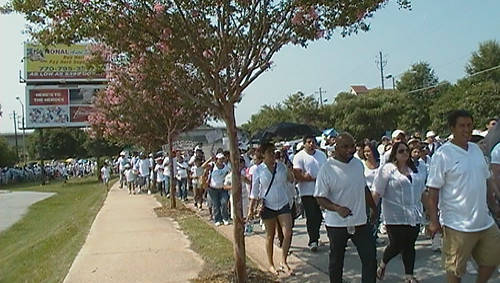 capitol on July 2nd for the March for Justice. This is people power! Visit SONGs flickr page for photos of the rally and visit
capitol on July 2nd for the March for Justice. This is people power! Visit SONGs flickr page for photos of the rally and visit 




